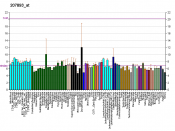When we look in the mirror it is quite clear that we are either male or female. However, for some people it is not that simple. The regular processes of biological sex determination don't always go according to plan. Mutations or other deviations in the chromosomal, phenotypic, and gonadal processes alter the routine outcomes of sexual differentiation. When this occurs, intersexed individuals where the outcome, expressing contrasting chromosomal and phenotypic sexes. Furthermore, every society seems to categories its members on the basis of gender. Even though gender and sex might seem analogous to each other, they are distinct mechanisms for classifying human beings. The more cultural and individual gender identity is different then the biological means of sex determination. Moreover, there are many ways that the inequalities between men and women are perpetuated in our society. Sometimes it is our society that has instilled the great amount of stereotypes that fuel the arguments among sexists today.
However there are still differences between the two sexes that are not anatomical, but arise as a result of our functioning and development of our brains.
The ability to define biological sex in humans alone is a challenging task because there is much ambiguity involved in the three cardinal determining factors of sex. Initially, it is common for a person to assume that it's a rather simple judgment when considering the phenotypic sex of females and males, which seems quite obvious. At the cellular level, it is the sex chromosomes that can reveal the sex of a being (Cummings 2008). At the molecular level, the existence and abundance of certain proteins that contrast in males and females, or gonadal sex, are also well established (Palmer 1989). Despite this false simplicity, all of these criteria have complications when we look at the infrequent exceptional individuals...


